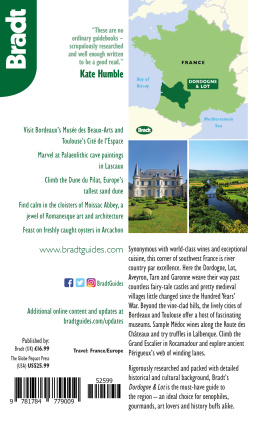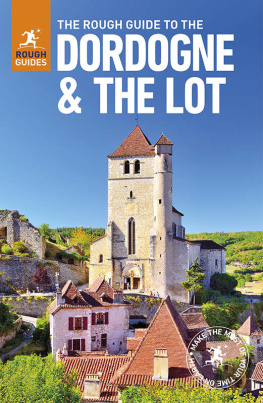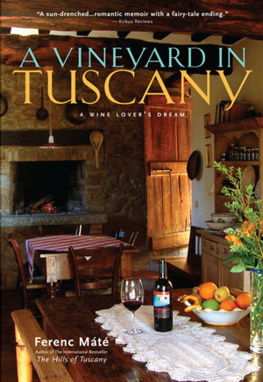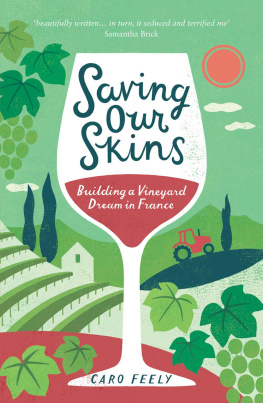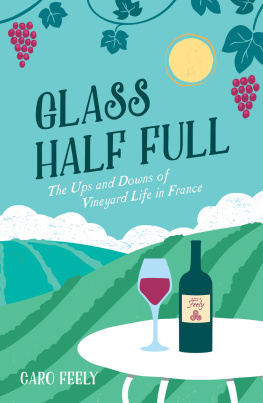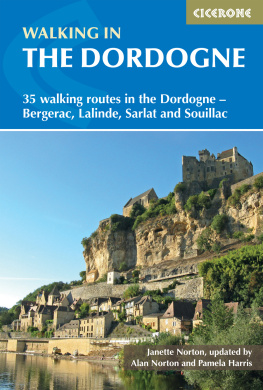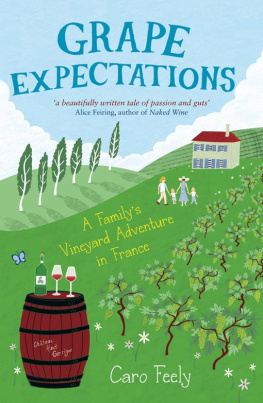WHEN I FIRST approached Nick Ryman with the idea of writing his story, he told me in no uncertain terms where to go. Undeterred, I rang back. The second time he repeated his distinctly unwelcoming message even more vigorously. Despite that rather unpromising start, I eventually managed to persuade him of the seriousness of my purpose and after careful consideration he decided to give my project the green light. From the outset I emphasized that while my approach would be sympathetic, it would not be sycophantic. And to his credit, Nick agreed.
The Bacco family, Joseph, Agns and Franois, whose lives were intertwined with those of the Rymans for over twenty years, also cooperated with me fully, and Ill never forget the red-carpet treatment they gave me when I met them for the first time.
The writing of this book took over my own familys life, as I whizzed between Bordeaux, Bergerac, Paris and elsewhere. But in fact, each time I inflicted my offerings on my wife Clair, she proved to be a skilful editor in her own right, and much credit is due to her insights.
I must also extend a big thank you to all the Josephs, both in France and England, who helped me in the research and writing of A Vineyard in the Dordogne.
I would also like to express my gratitude to the following people, all of whom assisted in various ways. So, very many thanks indeed to Eric Allonge, Pat Atkinson, Agns Bacco, Fabienne Bacco, Franois Bacco, Joseph Bacco, Anthony Barton, Richard Bartholemew, Malcolm Brinkworth, Ginette Cathala, Jonathan Cavender, Nick Cooper, Stephen Davis, Richard Dawes, Maryvonne Dene, Sue Donoghue, Carole Huber, Esme Johnstone, Sara Johnstone, Stan Kinns, Michle Lattes, Jean-Louis Lesage, Jonathan Margolis, Charles Martin, Sylvia Miller, Gabrielle Mondi, Henry Mondi, Patrick Montfort, Emil Perauer, Anne Ryman, Dr Anne Ryman, Camilla Ryman, Cicely Ryman, Corinne Ryman, Desmond Ryman, Hugh Ryman, Nick Ryman, Marie-Claude Sampson, Carole Sedler, Sian, Robert Smith, Marie-Pierre Tamagnon, Jean-Louis Trouillon, Murielle Valentini and Alan Whytock.
Jeremy Josephs
IT HAD BEEN his dream for as long as he could remember. To live in France. To make excellent wine in a vineyard of his own. And to make his home in an elegant chteau. Was this not, Nick Ryman wondered, many an Englishmans dream?
From the very first moment he set eyes on it he had fallen in love with Chteau de la Jaubertie. Thats exactly what I want, he said to the delight of the local estate agent. Ill take it. Not yet forty, he was in the fortunate position of being able to buy more or less what he wanted. All as a result of his own hard work, though, for he had spent the previous two decades transforming the familys small stationery business into a huge success and indeed a household name. Without hesitation he offered the full asking price of two million francs for the chteau.
The Sauvats, the wily owners, knew exactly how to handle their wealthy purchaser from overseas. For the next two years they were to blow hot and cold in respect of the sale, always managing to put up the price in the process. Nick Ryman had tried to free himself from the magical hold of Jaubertie. So too had his wife Anne. But to no avail, for in their search for an alternative they saw nothing to compare with it. Within two years the price had doubled. Offer four million then, Nick told the agent.
On Saturday, 29 September 1973, Nick arrived at a notarys office in Saussignac, a small village just outside Bergerac in the Dordogne, ready to sign the acte dfinitif. It was with much relief that he put his name to that legal document, despite the fact that he was paying considerably over the odds for his folie. Then Monsieur Sauvat did likewise. But when it came to Madames turn to append her signature, she appeared to hesitate for a while, as if overcome by the emotion of the occasion. Swiftly recovering her composure, she proceeded to give all those present a piece of her mind. I shall never sign for the sale of Chteau de la Jaubertie, she announced. And with those words she picked up the notarys fountain pen and hurled it across the table. Never.
SHE WAS HOPING for a girl. Though when she thought about it more rationally Agns Bacco knew very well that she really ought not to be expressing any particular preference. For by the early spring of 1963 she had been hospitalized for a little over a month in Bergerac, a picturesque Dordogne town and a centre of French gastronomy. There, just a stones throw from the river that gives the region its name, she had been left with little choice other than to comply with her doctors orders not to stray from bed so long as her bleeding showed no signs of abating. She might not have been able to read and write, but the rather squat, dark-haired nineteen-year-old hardly needed reminding that the chances of her pregnancy ever proceeding to term were slender indeed. Yet the fact that the odds seemed to be relentlessly stacking up against her did not deter Agns Bacco in the least. For as long as she could recall she had dreamed of one day giving birth to a daughter. She therefore summoned up all her spirit, the only resource available to her, it seemed, and positively willed the baby within her womb to be well. A devout Catholic, she would while away the hours in hospital by repeatedly urging the good Lord to intervene on her behalf and bless her with the gift of a girl.
The following week Agnss husband, Joseph, five years her senior, came to an informal accord with the temporal powers entrusted with his wifes care. Since no miscarriage appeared to have taken place Agns would be allowed to return home provided she remained confined to bed for the duration of the pregnancy. That meant another seven months with her feet up plus one injection per day for each of those thirty-odd weeks. A little sorrowfully, they returned to their village of St Germain-et-Mons, ten kilometres away, where Joseph earned his keep as a manual worker in the vineyards of Philippe Van der Molen, a Frenchman of Dutch ancestry.
Joseph wasted no time in adjusting his daily routine to meet the new challenges ahead. Before long he was as adept with a needle as any of the physicians or nurses who would call upon his wife, and soon learned to dispense with their services altogether. Each day, at approximately 6 p.m., after a hard days labour in the vineyards but before the evening meal, Agns would reveal her rear end for her husbands ministrations. With increasing confidence and expertise he would select a buttock and inject Agns with the progesterone prescribed by the family doctor to help ward off the possibility of a miscarriage. For the time being this twin strategy of inaction and injection seemed to be successful, for Agnss belly appeared to be growing bigger with every week that passed.
Wherever he went and whatever he did, Joseph preferred to proceed at a sprightly pace. He was often to be glimpsed at work, hurrying between one row of vines and the next as if he had an urgent appointment to keep. There could be no doubt that he did the work of at least two men, a fact which not unnaturally endeared him to his employer. Yet Joseph seldom paused to assess himself in such a way; he was simply doing what he enjoyed most of all hard work out in the open. Short and stocky like his wife, he was endowed with an enormously powerful frame, while his face already bore deep lines carved out by years of physical labour in all weathers, giving him a much older appearance than that of a man only in his mid-twenties. A legacy of formative years spent in a hot climate, the sunshine still shone out from his dark-brown eyes.



